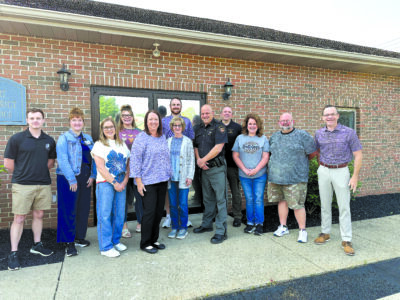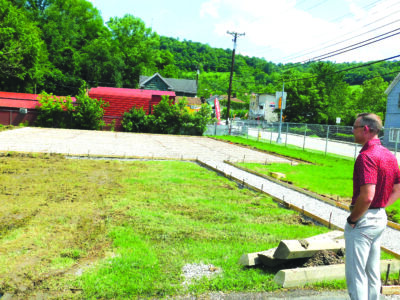Area dispensary to begin recreational pot sales
Sunnyside in Wintersville one of 98 locations across Ohio

Photo by Christopher Dacanay Sunnyside, a medical marijuana dispensary in Wintersville, was issued its dual-use certificate of operation from the Division of Cannabis Control to begin selling non-medical marijuana in addition to medical marijuana today.
WINTERSVILLE — The Division of Cannabis Control is scheduled to issue its first dual-use certificates of operation Tuesday, permitting one Jefferson County medical marijuana dispensary and 97 others in Ohio to begin selling non-medical marijuana.
Located at 180 Main St., Wintersville, Sunnyside is among that first batch of eligible dispensaries to be issued 10(B) dual-use certificates from the DCC, the Ohio Department of Commerce’s arm for regulating the state’s cannabis industry. As of the issuance, Sunnyside and the other existing medical dispensaries became legally authorized to sell non-medical cannabis in addition to medical cannabis, according to a release from the DCC.
The division is now roughly a month ahead of schedule, having been given a Sept. 7 deadline to begin recreational sales by Issue 2. Passed by a 57 percent majority vote Nov. 7, Issue 2 made Ohio the 24th U.S. state to legalize adult-use cannabis and the 14th state to do so through a voter-approved ballot initiative.
“We’re super excited to be able to open our doors and to be able to welcome people in to buy regulated cannabis for the first time in Ohio,” said Jason Erkes, chief communications officer for Cresco Labs Inc., Sunnyside’s parent company.
All five Ohio Sunnyside locations have been issued COOs — Wintersville, Cincinnati, Marion, Chillicothe and Newark — with all but the Newark location beginning recreational sales today.
“Consumers across the state are very excited,” Erkes said. “We’re getting phone calls from people asking if they can camp out overnight and stay in our parking lots for some of our stores to be able to be among the first to buy. I think that says a lot about how excited people across the state are.”
The law permits adults 21 and older with a valid ID to purchase up to 2.5 ounces of cannabis and 15 grams of concentrate, paying a 10 percent excise tax. Meanwhile, medical patients are exempt from the tax and may possess up to a 90-day supply, with specific amounts based on the product type.
“I think customers will be very surprised when they walk into a dispensary for the first time, as it’s a very different experience than the stigma associated with it would lead them to believe,” Erkes said. “The dispensaries are bright and welcoming, there are no glass jars with bare hands pulling a bud out. Everything is pre-packaged and child safety-sealed, much like you would see at your local pharmacy or drugstore.”
Products themselves will be stored in a vault until the purchase is made, with sample packaging on display, Erkes said. Sunnyside’s trained wellness advisers will be present to speak with customers about their goals and guide them through product dosing and consumption method “to make sure they have a good first experience.” With products ranging from flower and vapes to edibles and concentrates, the advisers’ work will be consequential, Erkes said.
Sunnyside locations are expected to be “very crowded” upon opening, Erkes said, even though the DCC has advised dispensaries that they’re allowed no fanfare or ceremonial decor on opening day.
Erkes said the Wintersville location is likely to draw a significant number of consumers from Pennsylvania and West Virginia, where recreational use remains illegal. Carrying marijuana across state lines remains federally illegal, though Erkes said it’s not the dispensary’s duty to police whether a consumer crosses state lines. Rather, he said, that would be local law enforcement’s duty.
Erkes encouraged consumers to visit sunnyside.shop to familiarize themselves with the dispensary’s offerings so they’re more prepared when they walk into the store.
The DCC’s release states that the issuance of COOs is “based on roughly the order in which completed applications were received by the division and when compliance asks were fulfilled.” The division plans to award COOs to all remaining eligible dispensaries later this week “to help ensure a fair and equitable rollout.” Not being awarded is likely due to a deficiency in the application, which the DCC intends to help applicants resolve.
James Canepa, the DCC’s superintendent, said, “A big reason we were able to get to this point ahead of the Sept. 7 deadline was due to the foundation laid through the state’s existing Medical Marijuana Control Program. Since existing licensees had already met stringent requirements of that program, we anticipated this process to be rather smooth. They had already undergone many of the comprehensive checks as part of that process.”
Qualifications included being able to properly process adult-use and medical sales with the tax differential consideration, meeting legal requirements for security systems, validating employee training, updating employee credentials and ensuring as much as possible inventory remains for medical patients.
“The requirements are not all that different from what they were for medical patients, but we’ve followed the state guidelines to make sure the staff is fully trained and ready to answer questions,” Erkes said. “We’ve been stocking up on as much product as we can and setting aside product for those medical patients to make sure, if there are any product shortages, they’ll be taken care of and still be able to get their medicine.”
Canepa said, “As the non-medical cannabis market opens, the division will continue to review and approve those 10(B) dispensary, or bonus licenses, for which eligible licensees have been able to apply with regard to additional locations. Since those additional sites will take time to construct, inspect and receive certificates of operation, we anticipate that, over the coming months and years, those 10(B) dispensaries will become operational.”





